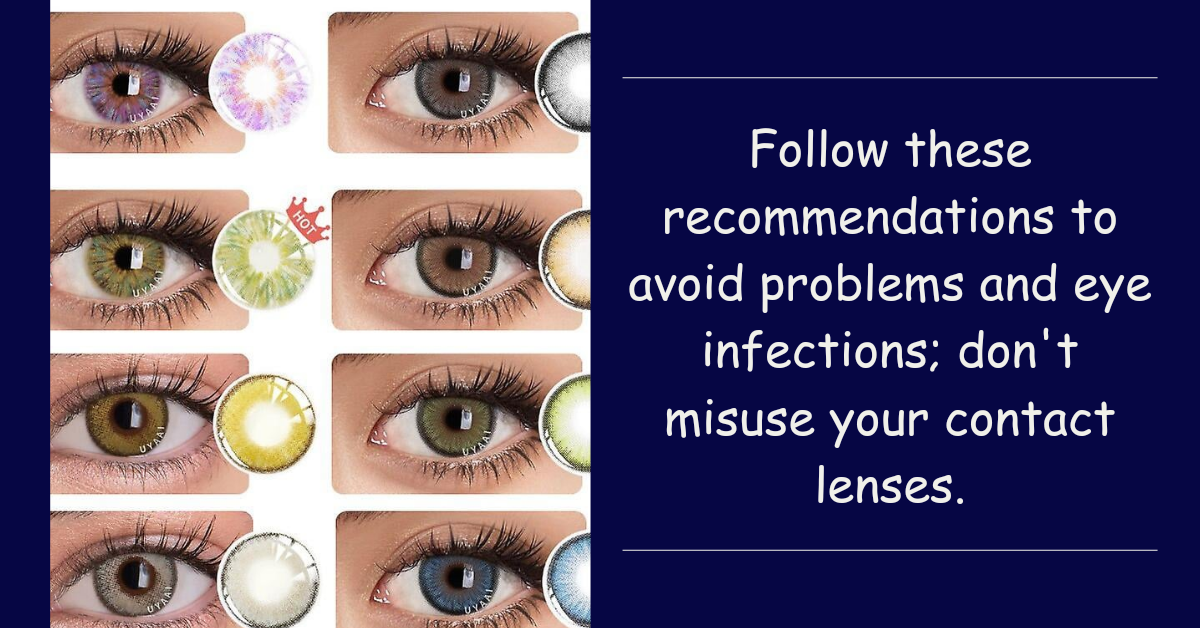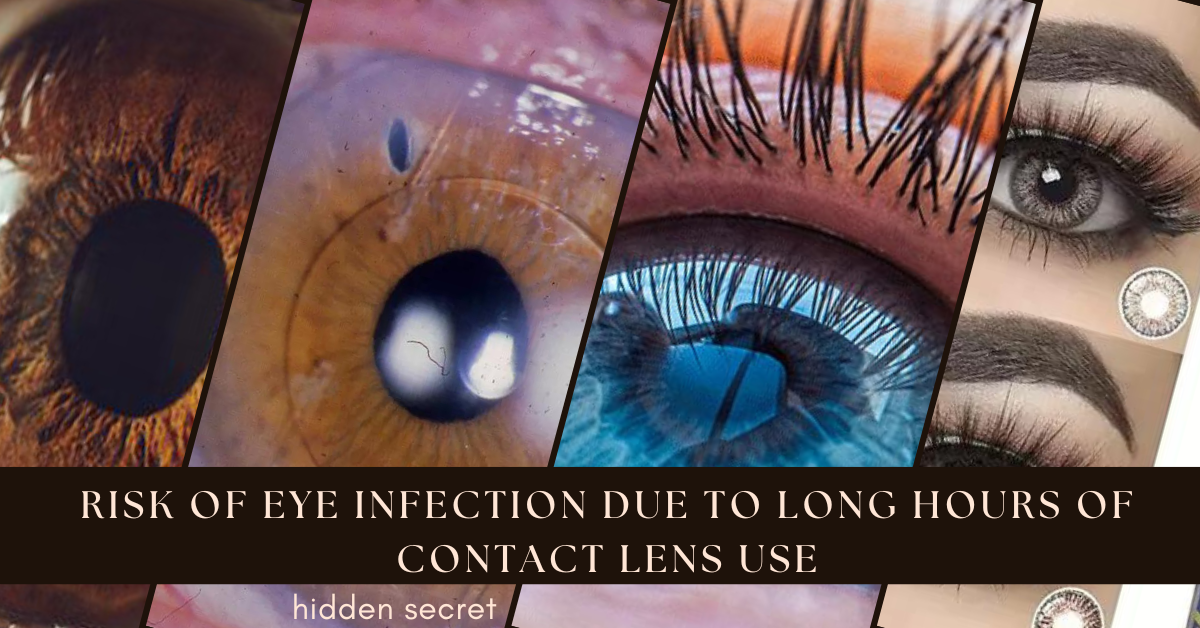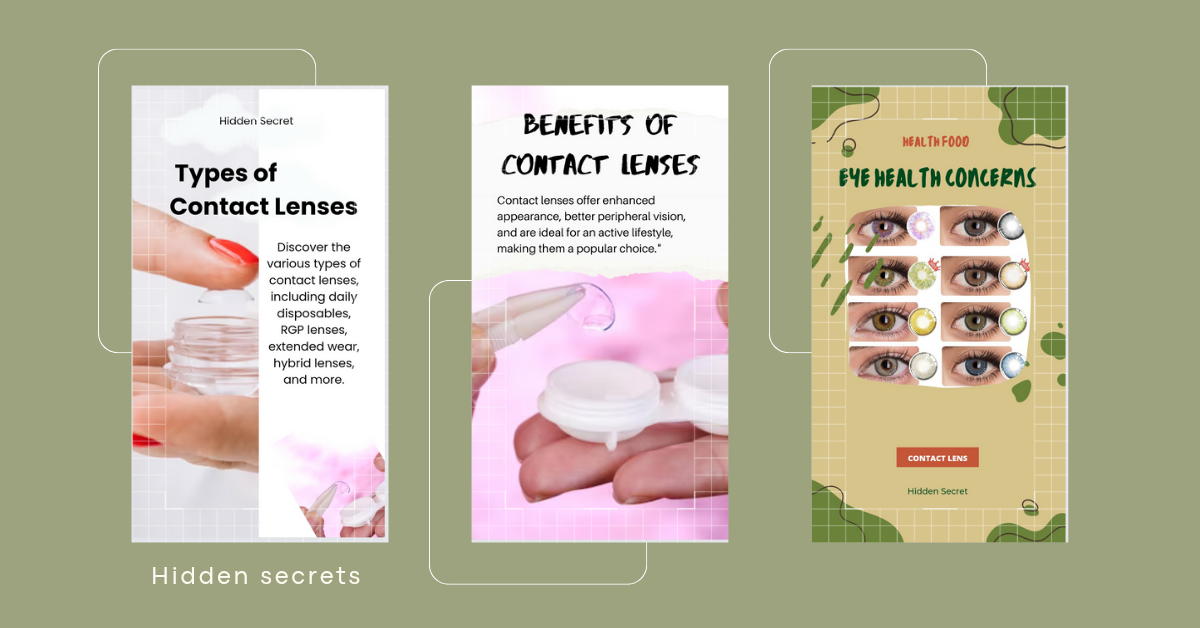Contact Lens Care: Protecting Your Eyes
Contact Lens Care: Protecting Your Eyes Follow these recommendations to avoid problems and eye infections; don't misuse your contact lenses.
The surface of the eye is immediately covered with contact lenses, which are very thin lenses. For a variety of reasons, they are frequently chosen by people instead of glasses.
Contact lenses not only provide all-round vision compared to conventional glasses, but they are also easy to use, and convenient when it comes to playing sports. Wearing them can also make teens and children feel better about their appearance and this can also help improve their performance and participation in sports. Contact lenses should however be used with care as there is also a risk of microbial infections, corneal ulcers, eye infections, and even blindness. Contact lenses should not be used more than the number of days that are designed to be used. The disposal of contact lenses can range from daily, weekly to monthly or yearly. One should also avoid overusing contact lenses and as per medical advice the hours can extend to 8-12 hours. ( Can castor oil treat poor vision, glaucoma? Experts reveal the truth)
It is estimated that over 150 million people worldwide are using contact lenses. Contact lenses are being used for correcting vision, for aesthetic or cosmetic reasons to improvise the colour of the iris and eye. Contact lenses are also being used for therapeutic indication where impending corneal perforation, non-healing corneal neurotrophic ulcers etc is required in specific cases. Contact lenses provide better peripheral vision as compared to conventional glasses. Hence, many sports person outdoor activity professionals prefer contact lenses more than the normal conventional glasses Senior Consultant, Ophthalmology, Marengo Asia Hospitals Faridabad, explaining the benefits of contact lenses.
Read more : Saffron Unveiled: The Mystique and Magic of the World's Most Expensive Spice
Complications related to contact lenses
There are some complications associated with use of contact lenses. Contact lenses are generally safe as long as these are being used correctly.
It's estimated that around 5% of wearers usually face complications every year. Now that damages to the contact lenses where is which start from eyelid to the conjunctival surface and up to the cornea. So, the main issue with contact lenses is poor lens care. If we are not using contact lenses properly, not taking care of contact lenses and its solution, it is being infiltrated by bacteria, fungus and some microorganisms like acanthamoeba. These lead to the more dreaded complications of the eye including cornea, threat of the loss of the vision and contact lens intolerance
Things to keep in mind to prevent these complications:
Remember proper wearing schedule of contact lenses
- Make sure you do not sleep with contact lenses on as it may lead to the complication of contact lenses over the cornea.
- It is advisable to refrain from overuse of contact lenses. Number of hours being advised usually is 8 hours per day. In some lenses, extended wearing contact lenses could be 10-12 hours per day also. But it should not be used more than.
- Contact lenses should not be used more than the number of days that are designed to be used. So, the disposal of contact lenses some are daily or weekly or monthly or yearly. That schedule should be tightly taken care of so that overuse of contact lenses can't lead to complications of cornea which can be very bad for your vision or cornea clarity.
- How contact lenses cause dry eye syndrome
- Wearing contact lenses for long hours can block oxygen supply to cornea and this can cause dry eyes. It is important to remove your contact lenses from time to time and let your eyes get some fresh oxygen.
Cornea is the only structure in the body which takes its oxygen supply from the atmosphere. Henceforth it is transparent. So, if it is being used for a few hours a day, then rest of the time our cornea recovers by taking the oxygen. But problem comes when we use extended hours of the day, therefore with time our cornea doesn't get enough oxygen from the atmosphere and hence slowly and gradually it leads to the complications where because of the decreased oxygenation of the cornea, corneal transparency gives way and complications start to occur including dry eye syndrome.
Risk of eye infection due to long hours of contact lens use
Wearing contact lenses for long hours makes your cornea susceptible to the infection where bacteria, fungus and microorganisms and this can develop into corneal infection. If they grow over the cornea which is transparent, your cornea may lose that transparency. Henceforth eye becomes red, painful, irritable, and foggy vision, loss of vision and at times permanent scarring of the cornea also occurs.
How to tackle long term complications
Long term complication of the overuse of the contact lenses (for than 10 hours per day) is decreased corneal thickness and increased corneal curvature.
"Usually, these types of medical complications occur in contact lens users who are using it for more than 5 years and continuously more than 8-9 hours per day. It is always advisable to discontinue contact lenses in between so that your cornea gets some rest, some rejuvenation and some reoxygenation. Henceforth you can safeguard your cornea till you want to use contact lenses without any complications,"
Read more : Monsoon delights: 9 delectable corn recipes to savour and celebrate rainy days
How Do Contact Lenses Work?
In order to rectify vision issues, contact lenses are small, curved, and frequently transparent discs that are applied directly to the surface of the eye. For those with various refractive defects, such as myopia (nearsightedness), hyperopia (farsightedness), astigmatism, and presbyopia, they provide as an alternative to spectacles.
To choose the best type of contact lenses for your unique prescription and lifestyle, it's essential to get a thorough eye exam and contact lens fitting by a trained eye care specialist. Additionally, while wearing contact lenses, adequate sanitation and care are crucial to maintaining eye health.
Types of Contact Lenses
1. Soft Contact Lenses : These are by far the most popular kind of lenses. They are made of pliable, soft polymers that permit oxygen to reach the cornea. Soft contact lenses are convenient and available in a variety of shapes:
Daily disposables are items that are worn once and then thrown.
- Bi-weekly and Monthly : Depending on the type, replaced every two weeks or once a month.
Astigmatism can be cured using toric lenses.
- Multifocal/Bifocal Lenses : These are used to treat presbyopia and allow for the correction of both near and far vision.
Cosmetic lenses that can alter or improve eye color are called colored lenses.
2. RGP (rigid gas permeability) contact lenses : These lenses are more robust and offer crystal-clear vision. They allow oxygen to reach the eye but may take longer to get used to than soft lenses. They last longer than soft lenses and are strong.
3. Extended Wear Lenses : These are made to be worn continuously for a predetermined amount of time, even while you sleep. They come in soft or RGP varieties. It's crucial to abide by the safety instructions provided by your eye doctor.
4. Hybrid Contact Lenses : These lenses offer the clarity of RGP lenses and the comfort of soft lenses by combining a rigid gas permeable center with a soft outer skirt.
5. Scleral Lenses : Extra-large and made to partially cover the sclera (the white area of the eye) and the entire cornea. They are frequently applied to uneven corneas, such as keratoconus instances.
6. Orthokeratology (Ortho-K) Lenses: To temporarily restructure the cornea, these specifically created RGP lenses are worn overnight. They can offer daytime vision that is clear without the use of corrective lenses.
7. UV-Blocking Lenses: Some contact lenses are UV protected to help protect the eyes from damaging ultraviolet (UV) radiation.
The perfect contact lens for you will depend on your individual vision prescription, way of life, and eye health. To find the best solution for your needs, it's critical to have a thorough eye exam and contact lens fitting by an eye care professional. Additionally, while wearing contact lenses, it's important to practice appropriate cleanliness and care for your eyes.
Do contacts outperform glasses?
Whether contact lenses are preferable than glasses depends on personal tastes, way of life, and particular eyesight requirements. Consider the following when contrasting contact lenses and glasses:
Benefits of contact lenses include:
1. Enhanced Appearance : Because contact lenses don't alter your appearance or cover your eyes like glasses do, some people find them more attractive.
2. Peripheral Vision : In comparison to glasses, contact lenses offer a more natural field of vision because they move with your eyes.
3. Active Lifestyle : Due to their lack of fogging, slipping, or obstruction, contact lenses are frequently recommended for sports and other active activities.
4. No Obstructions : Contact lenses have no frames that could hinder your vision, which makes them ideal for activities like photography.
5. No Reflections or Glare : Contact lenses block out light, however glasses can reflect or glare it.
The benefits of glasses include:
1. Ease of Use : Many people, especially those with sensitive eyes, find that glasses are a hassle-free solution because they are simpler to put on and take off.
2. upkeep : Compared to contact lenses, which need to be cleaned and disinfected, glasses require less upkeep.
3. Eye Health : Glasses don't make contact with the eye's surface, lowering the possibility of eye infections or irritations for contact lens users.
4. Cost : Given their extended lifespan and lack of continuing lens and cleaning solution purchases, glasses may end up being more affordable in the long run.
5. Dry Eyes : Since contact lenses can make dry eyes worse, people with dry eyes frequently find glasses to be more comfortable.
The decision to wear contacts or glasses is ultimately a personal one. It's crucial to discuss your preferences and vision requirements with an eye care specialist who can offer advice and assist you in coming to a decision. To fit various conditions and activities, some people even decide to wear both glasses and contact lenses.
Am I able to use contacts every day?
Several elements, such as the kind of contact lenses you use, the condition of your eyes, and your lifestyle, will determine whether you can wear contacts every day. Here are some things to think about:
1. Daily Disposables : You can use a new set of contact lenses every day if you use daily disposable lenses. These lenses are made to be thrown away after only one use, which is both practical and hygienic.
2. Bi-weekly or Monthly Lenses : Some contact lenses are made to be used for longer periods of time, usually every two weeks or once a month. However, you should take them out and clean them every day as directed by your eye doctor.
3. Extended Wear Lenses : You can wear contact lenses that have been certified for continuous or extended wear continuously, including while you sleep, for a certain amount of time. To reduce dangers, it's essential to strictly adhere to the recommendations of your eye doctor.
4. Eye Health : The condition of your eyes has a big impact on how frequently you can wear contacts. Your ability to wear contacts comfortably every day may be restricted by conditions including dry eye syndrome, allergies, or other eye problems.
5. Comfort : If a person has sensitive or dry eyes, wearing contact lenses every day may be uncomfortable for them. It's crucial to speak with an eye care specialist if you feel discomfort.
6. Hygiene : When using contact lenses every day, good hygiene is essential. To decrease the risk of eye infections, you must adhere to suggested cleaning and disinfecting procedures.
7. Backup Glasses : It's a good idea to keep a pair of backup glasses even if you decide to wear contact lenses every day. When you have an eye infection or irritation, for example, it can be best to take a break from wearing contacts.
It's crucial to have a thorough eye exam and a contact lens fitting by an eye care specialist before using contact lenses every day. They can decide which contact lens type is best for your eyes, prescribe the ideal wear schedule, and offer advice on proper upkeep. Keeping an eye on your eye health while consistently wearing contacts requires regular checkups with your eye doctor.
Do contacts improve your vision?
If you have refractive problems like myopia (nearsightedness), hyperopia (farsightedness), astigmatism, or presbyopia, then the answer is yes, contact lenses can help you see better. By changing how light enters your eyes, contact lenses are able to improve your vision and eliminate the need for spectacles in some cases.
It's crucial to remember that contact lenses do not provide you better vision indefinitely. While you wear them, they offer momentary correction. Your vision will revert to its original form if you take off the contacts. You must regularly wear and take care of your contact lenses as directed by your eye care specialist if you want to keep your improved vision.
What drawbacks do eye contacts have?
Eye contacts, or contact lenses, provide several advantages but also significant drawbacks, such as:
1. Discomfort : Some people experience discomfort when wearing contact lenses, especially when they are first adjusting to them. They might feel their eyes dry, itchy, or like something is in their eyes.
2. Infection Risk : Wearing contact lenses for an extended period of time, improper handling, or improper cleaning can all lead to eye infections. These infections have the potential to be severe and may need medical attention.
3. Maintenance : To avoid germs and debris buildup, contact lenses need to be cleaned and disinfected on a regular basis. This can take a lot of time and possibly cost more money for cleaning supplies.
4. Cost: Contact lenses can be costly, particularly if you choose daily-disposable models or ones designed specifically for vision problems like astigmatism or presbyopia. Compared to eyeglasses, the cost may increase with time.
5. Limited Wear Time : Some contact lens kinds, including monthly or bi-weekly disposables, have a finite shelf life and must be changed out on a regular basis. This recurring cost might be detrimental.
6. Not All People Can Wear Contacts: Not All People Can Wear Contacts. Wearing contacts may be inconvenient or even dangerous due to factors such as specific eye disorders, allergies, or dry eye syndrome.
7. Risk of Eye Dryness : Because contact lenses can limit the amount of oxygen that reaches the eye, they may make certain people more prone to eye dryness. This can lead to discomfort and may worsen existing dry eye issues.
8. Easier to Lose : Contact lenses are small and can be lost or dropped easily, especially when engaging in sports or water activities.
9. Visual Disturbances : When wearing contact lenses, some people may have visual disturbances like halos or glare, especially in low light or if the lenses don't fit properly.
10. Regular Check-Ups : To make sure their lenses are fitting correctly and aren't creating any problems, contact lens wearers often need regular eye exams.
Despite these drawbacks, a lot of people consider contact lenses to be a practical and efficient solution for vision correction. To decide if contact lenses are a good fit for your unique needs and way of life, it's important to weigh the benefits and drawbacks with an eye care specialist.








Post a Comment